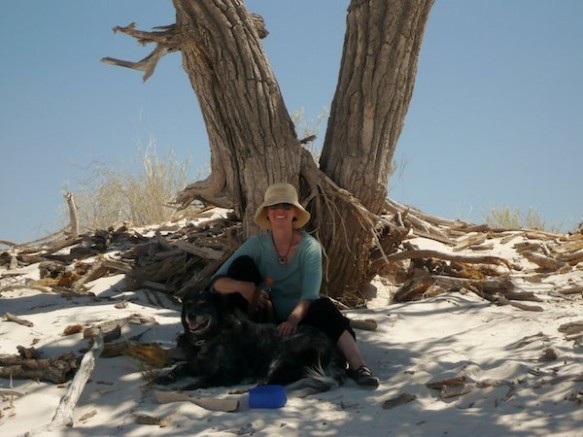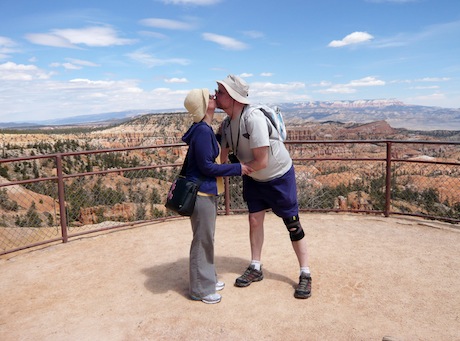Debt Free and Loving It
Each week we are profiling real people who are editing their lives for more freedom and happiness. This week we hear from Sigrid, who shares her story of living simply, lightweight and debt-free.
Tell us about yourself.
My name is Sigrid. I am almost 40 years old. I am a medical technologist and getting my Master’s in healthcare administration. My husband, border collie mix and I live in Seattle in a 1800 sq ft 1914 bungalow, where we grow veggies, fruit and fresh flowers. We also make beer yearly from our hop vine. My interests include medicine, minimalism, gardening and crocheting.
What makes your life an ‘edited’ one?
I think I’ve been on the life edited path for a while, but it has taken back-steps at times. Throughout my life, I have found a tremendous pressure to live a conventional American life with its ideas of success like large houses, fancy cars and jewelry, and other forms of materialism. This way of life says you aren’t successful if you don’t make and spend a large income.
After college, I felt obligated to grow myself professionally which also meant monetarily. At first, this seemed a reasonable goal as, like most college grads, I had debt and little savings. There was no where to go but up. But after a while, I started to feel embarrassed when I didn’t have more clothes, better car, etc. So, despite the fact I was exhausted chasing this way of life, I felt I had to attain at least some of these items in order to be socially acceptable.
The seeds of living another way [expanded on below] were planted in my childhood. I was raised in a devout household, and always had an example of non-materialism to look at.
I spent my formative years living in a beautiful 4400 sq ft Victorian house, which made me realize at an early age the downsides of materialism. Although the house had gorgeous white oak floors and paneled doors with brass kick plates, it was an upkeep nightmare. I dreamt of living in the woods inside a hollow tree listening to the wind and rain falling instead.
How long have you been living this way, and do see yourself continuing to live this way?
The active process started about ten years ago. My husband and I became convinced that we didn’t want to spend our lives in the rat race. We made a goal of paying off his car and my student loans before our wedding. We did it, and then we made our next goal to pay off the house by age 40. We did this too. Then, we began saving money for a rainy day, other goals, and retirement.
For me, debt was a form of slavery, even though we ‘voluntarily’ acquired it. The more debt we had, the more a our lives existed to serve the debt. Shouldn’t money serve the needs of people, and not the other way around? The freedom of being debt-free is indescribable. The day we paid off our house was one of the happiest days of my life. I can’t see going back to the conventional way of life.
What are the biggest advantages of living this way?
Because we have so little overhead, we are free to do what we want when we want. This spring we decided to take some time off work before I started grad school. We loaded our small sedan with our suitcases and 10 year old border collie mix Lainie, and drove off into the wild blue yonder. We had a rough idea of what we wanted to do, visit the Grand Canyon and visit with family and friends, but no set itinerary. We covered six states, 7000 miles, and saw most of the national parks in the western US.
We lived in one room motel rooms, washed our clothes in the motel laundry, mostly ate at inexpensive restaurants or PB&J sandwiches from the local grocery stores. We couldn’t buy a lot of souvenirs because there was no room in the car for them. This automatically forced us to focus on the non-material aspects of the trip such as the large amount of free time we had to spend together. The trip was wonderful. It strengthened our relationship and created lasting memories.
What are the biggest challenges?
Even with the Great Recession, my husband and I deal with a lot of misunderstanding as to why we choose to be relatively frugal, which can be challenging. It just doesn’t fit with the American Dream or ideas of success endemic in our culture.
What many people don’t realize is that money saved is money earned toward living life more fully. Being disciplined can be difficult, and some people feel guilty and then angry when faced with this kind of self-limitation. They have been socially conditioned to feel deprived if they don’t spend money, rather than free from anxiety.
Do you and your husband think you could maintain this lifestyle with a family?
Yes, although raising children is a bigger drain on the family budget. It would take longer to save the money up for such a trip. It would probably also make more financial sense to buy a used camper to sleep in rather than motel rooms. The kids would probably enjoy it. If they had to be taken out of school for the trip, we would teach them ourselves so they wouldn’t fall behind in school.
What is the number one suggestion you’d give to someone looking edit their lives?
Set a goal and stick to it regardless of what other people think. After all, if you are burdened with debt, you are the one suffering from the debt and not the Jones down the street. Be creative in coming up with ways to get things done or have fun without spending money, but don’t skimp on important things like health insurance, or repairs to a home or car that could be dangerous if left undone. Spend wisely, not frivolously.
Remember, for every item you purchase you have to work some amount of time to pay for it. More money can always be acquired, but more time cannot. Once the time is spent, it is gone forever.
What item(s) have made your lifestyle easier?
We keep a few card or board games on hand to play. We substitute social interaction for material acquisition.
Do you have any design or architectural suggestions derived from your lifestyle?
Put size limits on your house, car, etc. It makes it easy to forgo impulse purchases. There is no place to put extra items. With no place to put things, you don’t go shopping without a list. We immediately throw catalogs in the recycling bin without looking at them.
Also, almost no one needs a 4400 sq ft house like I had as a child. Each room in your house can do double duty, kitchens and bathrooms excepted. Specific architectural style is less important than using the space inside the home wisely.
Anything else?
For anyone serious about getting out of debt or downsizing, I recommend reading “Your Money or Your Life” by Vicki Robin and Joe Dominguez. It very eloquently demystifies money and our relationship to it. Then, the book presents a 9 step program to get out of debt and live your life more fully. Following a frugal lifestyle is easier knowing that others have done the same thing.






